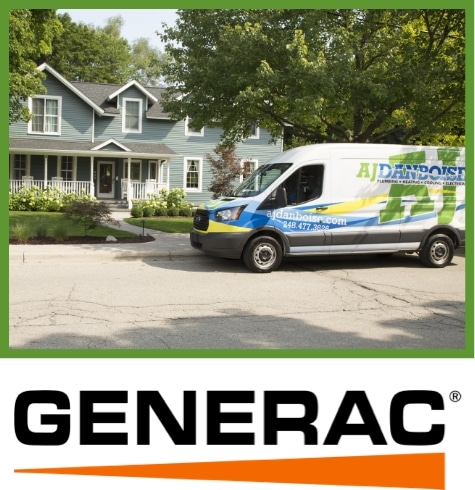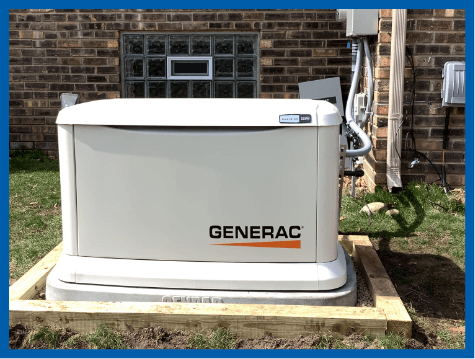Frequently Asked Questions
What is a standby generator?
A standby generator is a backup power system that automatically turns on during a power outage, providing continuous electricity to your home in Northville, MI, ensuring that your essential appliances and systems stay operational.
How does a standby generator work?
A standby generator is connected to your home’s electrical system and powered by an external fuel source such as natural gas or propane. It monitors your utility power and automatically starts within seconds of detecting an outage, supplying power to your home.
What size generator do I need for my home?
The size of the generator you need depends on the electrical load of the appliances and systems you want to power during an outage. A professional from AJ Danboise Plumbing, Heating, Cooling & Electrical can help you determine the appropriate size based on your specific requirements.
What are the benefits of installing a standby generator?
Installing a standby generator provides peace of mind, ensuring your home remains powered during outages, protecting against potential damage from power loss, and maintaining comfort and safety for your family.
How often should I service my generator?
It is recommended to service your standby generator at least once a year, or more frequently if it is used often. Regular maintenance ensures reliable operation and extends the lifespan of the generator.
Can a standby generator increase my home’s value?
Yes, installing a standby generator can increase your home’s value by providing a reliable backup power source, which is an attractive feature for potential buyers, especially in areas prone to power outages.
How long can a standby generator run continuously?
The continuous running time of a standby generator depends on the fuel supply and the generator’s design. Most standby generators can run continuously for several days as long as they have a sufficient fuel supply.
Is professional installation necessary for a standby generator?
Yes, professional installation is necessary to ensure the generator is correctly connected to your home’s electrical system and fuel source. This ensures safe operation and compliance with local codes and regulations.
What are the maintenance requirements for a standby generator?
Maintenance requirements for a standby generator include regular oil and filter changes, battery checks, and inspection of the fuel system. Scheduling regular professional maintenance helps ensure the generator operates efficiently and reliably.
Are there different types of generators available?
Yes, there are various types of generators available, including portable generators, inverter generators, and standby generators. Each type has its specific use cases and benefits. For whole-home backup, standby generators are the most reliable option.
How do I choose the right fuel type for my standby generator?
The right fuel type for your standby generator depends on availability, cost, and your specific needs. Common fuel types include natural gas, propane, and diesel. A professional from AJ Danboise Plumbing, Heating, Cooling & Electrical can help you decide the best option for your situation.
What should I do if my generator fails to start during a power outage?
If your generator fails to start during a power outage, check the fuel supply, battery, and circuit breaker. If the issue persists, contact a professional technician for a thorough inspection and repair.
Are standby generators noisy?
Modern standby generators are designed to operate quietly, with noise levels comparable to a central air conditioning unit. Noise levels can vary based on the model and installation location.
What are the costs associated with installing a standby generator?
The costs associated with installing a standby generator include the price of the generator itself, installation fees, and any necessary permits. The total cost can vary based on the size of the generator and the complexity of the installation.
Do standby generators come with warranties?
Yes, most standby generators come with manufacturer warranties that cover parts and sometimes labor. Be sure to review the warranty details when purchasing a generator and keep up with regular maintenance to ensure coverage.

